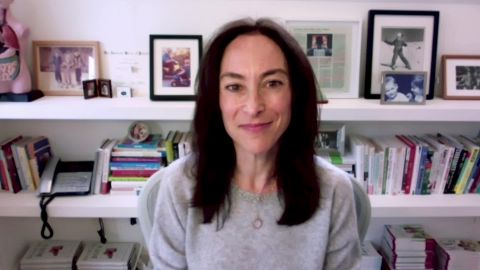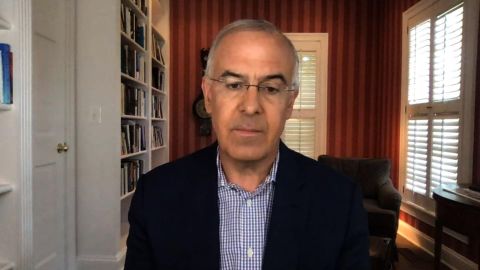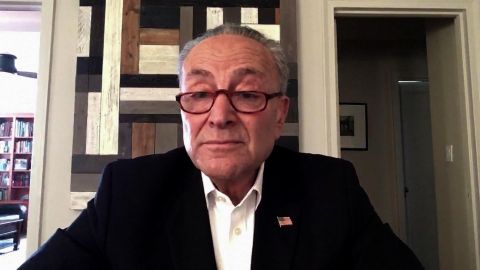Read Transcript EXPAND
CHRISTIANE AMANPOUR: Being a teenager isn’t easy at the best of times, let alone during a global pandemic, when teens and young adults are seeing graduations, proms, entering the professional world all on hold for now. But pediatrician and parenting expert Dr. Cara Natterson thinks lockdown does not have to be all bad. She’s been quarantining with her own children, and she says this enforced isolation might actually help teenagers to find their voice. Her latest book is called “Decoding Boys: New Science Behind the Subtle Art of Raising Sons.” And here’s Michel Martin asking her all the questions many parents want the answers to.
(BEGIN VIDEOTAPE)
MICHEL MARTIN: Thanks, Christiane. Dr. Natterson, thank you so much for joining us.
DR. CARA NATTERSON, AUTHOR, “DECODING BOYS: NEW SCIENCE BEHIND THE SUBTLE ART OF RAISING SONS”: Thank you.
MARTIN: You are recognized, I think, all over the country, maybe all over the world, for your work — well, offering practical guidance to preteens and teens and their parents about their bodies. That dates to your work with the American Girl series, “The Care and Keeping of You,” and then you have subsequently done a book for boys — and their parents called “Decoding Boys.” From your standpoint, what’s so important about the preteen years and then subsequently the teen years? Why do they matter so much?
NATTERSON: I don’t think I have ever met anyone who’s desperate to go back, right? So there’s that. But they’re very foundational, right? So, if you flash back for just a moment in your own mind to a formative memory, it’s going to be (AUDIO GAP) whether it’s very positive or very negative, and it’s probably going to be from your tween or teen years. It’s almost never from before that stage. Part of that is that brain development dictates that we remember things much, much better when the middle part of our brain is fully mature limbic system. That happens when you’re a tween. So you have got these very formative memories, and you’re building the foundations of knowledge starting when you’re 8, 9, 10. And then, when you’re 12 — anyone who’s raised a teenager knows that, when kids turn 12, some sort of switch goes off in their brain. And suddenly you, the parent, goes from being really important to really not so important. And it’s a little bit of a farce, because kids are, by and large, still really reliant upon their parents for the feedback and for — they’re really looking to their parents for role modeling and for approval, but they don’t wear that on their sleeve. At 12, they tend to shift to wanting peer review, I would say, peer support and peer love. And they take care of shame very seriously. So that all happens around 12. Now you’re heading into the teen years. So you have got this ability to form really foundational memories, and then you layer upon it individuation or a desire for independence. And the combination of what happens then following, you’re 13, you’re 14, you’re 15, you’re 16, and in many states, you can drive. You’re starting to be able to work and get a job and be financially a little bit more independent. Well, we see where that goes.
MARTIN: And now, as we — as you and I are speaking, we’re in the middle of a global pandemic. And many countries around the world have shut their doors, I mean, literally shut their doors. They have told people to stay home. And this is happening, as you’re telling us, at the very point at which kids this age want to bust loose. What effect do you think this is having on them?
NATTERSON: Well, I have no doubt it’s having a tremendous effect. I don’t know what that effect is. And I think that’s going to be an incredible thing to study as we move through pandemic and then we get beyond pandemic. We know for sure that there is a conflict right now between the desire for teenagers to be independent and the shelter-at-home orders that are in place in many parts of the country. So, we see that conflict play out. I have heard from many, many parents about how that conflict is evolving in their own home. In some homes, it’s tricky. It’s very rough, because kids, given their temperament, their personality, the dynamics in their home, how many people live there, how narrow and close the space is — there are so many variables.Depending on how it all sets up, there are some homes in which this is really hard. There are other homes in which it’s actually going OK, that kids do want to individuate, but they also want to reconnect with their parents, and the parents are loving it, and the kids are thriving. So there isn’t one way to experience pandemic. And there isn’t one way, I think, that kids will emerge out the back end, but it’s going to be really interesting to see where it all settles out. MARTIN: What are you worried about, and what gives you hope right now? And I’m just going to set the table. In terms of worry, I mean, I think any thinking person is worried about kids who are in truly dire circumstances. I think people, I think, are — all around the world are worried about kids who are being preyed upon, particularly sexually and physically. So, I just think — let’s establish that that’s clearly a worry. I think all the social service agencies are telling us that that’s a worry. But, apart from that, for kids who aren’t in such dire circumstances, is there anything that you worry about?
NATTERSON: I do want to add to your list of worries all of the health worries. So there are — the worries about physical safety are tremendous. And we know that. And I’m also very worried about kids getting coronavirus. While many do not get ill with coronavirus, we are seeing very clearly that some do, especially with this new MIS-C syndrome, which is sort of the Kawasaki’s-like inflammatory syndrome. So, not to pile onto your list of worries, but you got to add that one. But in terms of what do I worry about in — developmentally for kids or how they express themselves and how they’re going to grow and evolve as people, I worry in a bunch of different directions. When we talk about introverts and extroverts, the way I think of an introvert is someone who draws energy from themselves. And I think of an extrovert as someone who draws energy from other people. So, I do worry about extroverts not being able to draw their energy because they’re not sharing space with a wide variety of people. And we see that play out in lots of different ways, one of which is depression. Introverts, it’s not that they’re protected from depression, but they definitely — the child who does play piano and write and journal and is — their soul is filled, I think of that as a little protective in this time, but it doesn’t mean that they’re immune to depression. What do I see hope in? Well, two things. One is that I do feel that, as the pandemic goes on, we will be forced, as a culture, to shift our mind-set from a very selfish me-me-me mind-set to a broader us mind-set, where we think about other people, and we become empathic in a different way, and we think about our responsibility to care for others. I wish we had started out that way before this pandemic, but, as a culture, we have not done a great job of thinking about others before ourselves. Many individuals do, but, as a whole, I don’t think we have done a great job. I think we must get better, because that’s one thing that is going to fight coronavirus is our willingness to do little things, put on a mask, right, to protect the people around us. So that’s one thing that gives me hope, is, I am starting to see evidence of a little bit of shift there. The other thing that gives me hope, honestly, is I see an end to helicopter parenting. I really do. There are…
MARTIN: What do you mean? Because the helicopter is, like, stuck in the house?
(LAUGHTER)
NATTERSON: You got it. The helicopter has landed, OK? The reality is, there is no sport or academic competition to be the best at, at the moment. There is very little getting ahead for the sake of getting ahead in this current iteration of our world. And kids, just like their parents, have been charged with the task of figuring out what actually makes them happy. What are you into? Get bored and figure out how you want to spend your downtime. I think that’s the beginning of the end of a parent determining the path for their child in a very prescriptive way. And that brings me great hope.
MARTIN: That’s interesting, because I would have thought it might be the opposite. One of my list of worries that — that I just happened not to add was, parents who were already like all in their kids face all the time, that now there is no escape.
NATTERSON: it could totally go that way, no question. And I’m sure, in some households, it has. I just don’t see a big avenue for that, right, because what has happened is, sure, you can stack and load in certain directions. But, by and large, a number of things that parents did to overschedule and overcommit their kids simply don’t exist right now. And so it’s been an interesting pivot, I’d say, for the kids, especially the older teenagers, to be able to not push back, but maybe find voice a little bit more. And I hope they hold onto that.
MARTIN: Do you see any difference between the way, broadly defined, young people who identify as girls might be experiencing this vs. young people who might identify as boys might be experiencing this?
NATTERSON: Well, it’s a great question. And I have a mini-study in my own practice. Again, I can’t wait to see data around this. But, by and large, as girls go through puberty, not all, but many become increasingly vocal about what’s happening to them, what their body looks like, how they’re feeling, the milestones they’re reaching. That’s not an accident. We have done a really, really good job of giving girls voice. We have reinforced that. And I believe that the MeToo movement has pushed that ball very far down the field. But girls are also, by and large, more likely to use their voice. When they go into puberty, for whatever reason, they become a bit chattier. Boys, on the other hand, again, not all, but most, get quiet, and they get quiet. They retreat behind a closed door. They go to single-syllable answers or grunts or nothing. And parents take it very, very personally. And I have come to believe — and I write a lot about this in “Decoding Boys” — that there has to be a chemical connection there. Testosterone has to somehow be involved. No studies on that, but I’d like to see one. So there’s a component of that. And there’s also clearly a social component. Right? Something happens where our boys’ quiet is reinforced. Oh, it’s, he’s just going through puberty. That’s just what they do. Cue the closing door. Now kids are stuck home. And what parents have started to tell me — and I do have a 14-year-old boy living under my own roof, so I have seen it with my own eyes — is that the door isn’t shut quite as much, that the sentences aren’t quite as short. And I think that the reason is that our kids leave for school first thing in the morning, and they’re gone eight, 10, some of them 12 hours a day. And I think the coping strategy for many boys has been to come home and to shut the world out. They have had enough, and they just want to shut the world out. And when you’re home all day, and there are only three or four or five people for you to engage with in a physical way and in a sort of meaningful physical way, you kind of don’t want to shut them out all the time. And I think that’s why we’re experiencing our boys reemerging and conversing with us. And it’s not that they’re chatters. I mean, I — a lot of parents are telling me their boys are still quiet and reserved and withdrawn for a little — this period of time, this transitional period of time, but it feels different. It feels different.
MARTIN: So maybe it’s an opportunity, even though it’s obviously — for people who’ve lost people, family members, loved ones, it’s a terrible time. For people who’ve lost jobs, it’s a terrible time. But if you can hold that wolf at the door, I think what I hear you saying is, this can be a very rich time and a way to engage with your kids, who otherwise you might not even be seeing until they’re about to go to sleep.
NATTERSON: I think that’s right. And, frankly, there has been a lot of loss. And there will be more loss, I’m sorry to say. And I think that — we should — as parents, we should take advantage of the fact that we have this moment to get through loss as well, that we are together as family units in a very different way than we ever were before. And so to embrace that, through loss, there may actually be a silver lining there as well.
MARTIN: Let’s talk a little bit more about advice that you might have for parents right now who want to do right by their tweens and teens at home, who have sympathy for the fact that they can’t run out and play soccer or lacrosse, run track, basketball, whatever they — skateboard, whatever they like to do, and just realize all the things that they’re missing, no prom and being with friends. And summer camp is a big deal for some kids. Going away for the summer is a huge part of some kids’ life and memories. I mean, do you have some advice for parents trying to help their kids through this time?
NATTERSON: Yes. So, I think I don’t know is probably the most important phrase we can all wrap our brain around. It’s a very hard phrase for us to get used to. Doctors have been historically very bad at that phrase. And I think we’re getting a whole lot better at it. And I think some of the best doctors are the ones who use it often. We don’t know. So, to parents, I would say, on the one hand, have deep empathy for your kids, right, especially for your kids who are hitting milestones that are going to look and feel different. And that’s not just the teenagers who are graduating from high school. There are milestones all along the way that kids will miss. And I think be empathic about that. It’s very important for parents. But, parents, don’t overly dramatize what’s happening to your kids. So I have parents of preschoolers calling me, and they are panicked about their child not being able to have fill in the blank celebration at preschool. And what I remind the parents is, it’s your memory that you’re worried about. It’s the — your photo-op. Your kids are actually pretty resilient. They will be fine. So, don’t — let’s live in a middle lane here. Let’s not — let’s have empathy, but let’s not overly dramatize it, to the point where we make our children feel that the shift in their current lifestyle is traumatizing to them. Trauma looks like serious illness and death. Trauma looks like abuse in the home. Trauma doesn’t look like missing a lacrosse game. I know that’s hard. I have empathy. But that’s different from trauma. And I think it’s on parents to get a little perspective, to pull the lens back, and to help their kids understand what’s going on for other people. I would also say to parents, talk to your kids. I said this before coronavirus. This is my big mantra, talk to your kids, talk to your kids. Now I believe it more than ever. And if you don’t know the answer, if you don’t understand what’s going on, look it up. If your kids are old enough, if they’re middle or high schoolers, read articles with them or share articles between yourselves or watch videos. Find reputable news sources that are going to give you reasonable information, which is hard to do these days, because there’s a lot of conflicting information. But educate yourselves and talk about all this. And, finally, do not judge other people. You do you. Do you safely. But leave judgment of other people aside, because we have got enough to focus on by just trying to take care of ourselves and everyone around us. So let’s do what’s right for the world without spending a lot of energy getting angry at the people who are around us.
MARTIN: Dr. Cara Natterson, thank you so much for talking with us.
NATTERSON: Thank you so much.
About This Episode EXPAND
Christiane speaks with U.S. Sen. Chuck Schumer to discuss current events. She also speaks with author David Brooks about finding purpose. Michel Martin speaks with Dr. Cara Natterson about how the pandemic is affecting teenagers.
LEARN MORE


